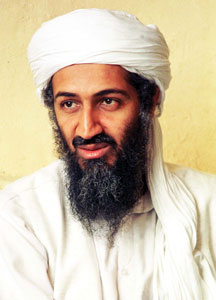PRINCETON – In Riyadh last March, King Abdullah of Saudi Arabia decorated American Vice President Dick Cheney with the Kingdom’s Order of Merit. This gesture elicited hundreds of Internet postings from Arabs condemning the award as treachery and lamenting the pitiful state of leadership in the Arab world. To cite only one comment, addressed to the King: “Shame on you for claiming to be Custodian of the Two Holy Sanctuaries” in Mecca and Medina.
At the same time, Osama bin Laden released two audio statements condemning Western and Israeli attacks on Muslims and reiterating the need for violent warfare to liberate occupied Muslim territories from the infidels.
In terms of media strategy, the contrast between the leaders of the Arab countries and bin Laden could not be starker. On the one hand, Arab kings and presidents lack charisma, seem politically impotent and are rarely, if ever, on message with respect to the “big issue” concerns of the peoples of the Middle East.
Bin Laden, however, is mesmerizing, framing the perceived frustrations of many Arabs in his use of classical Arabic, including the recitation of medieval-style poetry. He deliberately projects an image of himself as a leader who speaks truthfully, conveying a muscular ideology that articulates the sense of humiliation that Muslims feel today and offers a plan of action to remedy the situation.
Arab culture places a high value on poetic expression, so it is no coincidence that it appears repeatedly in al Qaeda’s propaganda. Bin Laden often recites poetry to underscore a point and to associate himself with chivalrous and learned warriors who were willing to become martyrs for Islam’s honour and glory. Here are a few lines of the kind of poetry that al Qaeda uses:
I do not sell our honour like a pimp
that I should lower my eyes, or surrender.
I see the army of the Cross in our land,
Invading Iraq and rubbing our face in the dirt.
You who ask me to give up our jihad,
And to live a life of comfort and happiness,
Don’t waste your breath.
I will not give up the jihad while our community
Is gored with a poisoned knife;
No indeed, I will not give up the jihad
While their Crosses attack in the dark of night,
Pollute Sacred Arabia, and proclaim
The establishment of “security” while chaining my wrists.
It is difficult to know what to make of this literary material, and at times to understand it because of its archaic style, allusions and metaphors. But al Qaeda’s poetry deserves closer attention, because it is a medium of communication between members of the movement.
Indeed, through poetry, al Qaeda defines what it means to be a member of the movement and commemorates the big episodes in the group’s history by glorifying the exploits of “martyrs.” Although much of this poetry is not necessarily of high quality, it nonetheless underscores the image that al Qaeda’s leadership wishes to project, namely that al Qaeda’s message is authentic and reflects “real Islam.”
Moreover, al Qaeda uses poetry to address the challenges that it faces. Contrasting its fighters’ bravery and commitment with the “comfort” of Muslim bystanders, al Qaeda tries to rally more fighters to its cause in Iraq. Its dilemma is stark. The Shiites of the Mahdi Army defeated Iraq’s Sunnis in the last bout of fighting, and thousands of Iraqi Sunnis, under the so-called Awakening Movement, have rallied to the side of the United States forces and have fought against al Qaeda.
In addition, many Sunni scholars have argued that al Qaeda’s ideology and tactics are illegitimate, and that Muslims should refrain from jihad and remain obedient to their rulers. The term for those who have not joined al Qaeda’s jihad is the “sitters” or the “immobile ones” ( qaaidun ). Bin Laden wants these people to feel like sinners. Poetically, he attacks Muslim men’s masculinity and sense of honour for not defending Islam.
This is the core of bin Laden’s appeal: the ability to articulate the profound sense of injustice and humiliation that many Arabs and Muslims feel today. For all the violence perpetrated by al Qaeda, bin Laden also relies on “soft” power, using arguments about injustice that resonate with his audience. A path between the extremes of jihad and blind obedience to the Middle East’s authoritarian rulers must be found before al Qaeda’s message begins to lose some of its luster.
(Bernard Haykel is Professor of Near East Studies at Princeton University.)
Copyright: Project Syndicate, 2008. Exclusive to The Sunday Times
|

